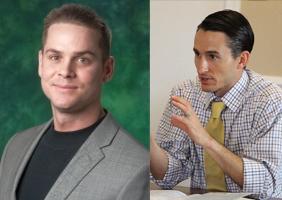
Two Kinder Institute professors, Adam Seagrave and Nicholas Drummond, and the managing editor of the Columbia Daily Tribune, Jim Robertson, discussed free speech in the digital era at the Columbia Public Library on Monday.
The speakers agreed that the media is in a peculiar place due to the divisive political climate and the proliferation of technology, which makes it easier for everyone to express their opinions through their own personal platforms.
“The opinion may be absurd and ridiculous and wrong, and you may disagree with it entirely,” Seagrave said, quoting the philosophy of James Madison. “You don’t necessarily have to respect the opinion as much as the person which that opinion is a part of.”
About 50 people were in attendance. The last 30 minutes of the discussion were open to questions from the audience.
Drummond spoke about hate speech in the digital age. He questioned how hate speech can be defined and who is qualified to make this distinction, bringing up the recent discussion surrounding Milo Yiannopoulos’ canceled speech at the University of California-Berkeley.
“The argument was that Milo, what he speaks of, his manner of speaking and the topics he speaks about are dangerous, and that a greater good was served by shutting down the event,” Drummond said.
Drummond questioned the platform given to radical speakers such as Yiannopoulos and later referenced Dylann Roof, the convicted perpetrator of the 2015 Charleston church shooting. Roof claimed his inspiration for the attack came from radical right-wing websites.
“The problem with having Milo speak, some might argue, is that having this individual come up and speak in front of a podium gives him more legitimacy than he might have had before, just by being onstage,” Drummond said.
Robertson discussed the “echo chambers” we put ourselves in as consumers of the media by reading only the viewpoints from news outlets and people we agree with. He said that the divisiveness of politics hasn’t gotten more extreme, but the tools have.
“Back in the day, we chose our ideology by either buying the Post-Dispatch, for the progressives, or the Globe-Democrat, for the conservatives,” Robertson said. The Globe-Democrat was a daily St. Louis-based newspaper that ceased publication in 1986.
Seagrave spoke at length about the philosophy of Madison, who believed that all citizens should have a constitutional right to freedom of speech.
“Our ability to understand the truth is imperfect, and we are usually wrong, probably, some way in our understanding of the truth,” Seagrave said. “But there is hope — hope that we can understand part of it. We can make progress in that understanding through dialogue with others.”
Madison also believed that freedom of speech was directly connected to the right to own property.
“A man has a property in his opinions,” Seagrave said, echoing Madison’s ideology. “In this age of Twitter, Facebook and social media, behind every opinion is a person, and that’s what Madison is saying here. Even if it’s expressed online or through a computer screen, that’s still part of a person.”
Drummond spoke later about David Irving, an English “Holocaust-denier” arrested in Austria for giving speeches claiming Adolf Hitler was unaware of the Holocaust as it was happening.
“It’s only by knowing the counter-arguments that we have a full understanding of the truth,” Drummond said. “[Philosopher John] Mill’s argument is that to defeat someone like this [Irving], you need to do a little reading. You need to go out and do research on the Holocaust. And that’s something that you otherwise might not do.”
Drummond supported Mill’s philosophy, which states that truth can only be arrived at through an open discourse of competing viewpoints.
“It’s someone like Irving, someone who takes such a dangerous, radical position, who would be the incentive for some of us to step out of our complacency, to actually dig into the details [and] have a better understanding,” Drummond said.
The event was co-sponsored by the League of Women Voters of Columbia-Boone County and the Columbia Public Library. The discussion complemented the exhibit celebrating the 225th anniversary of the Bill of Rights, which will be on display at the library through Feb. 28.
_Edited by Kyle LaHucik | [email protected]_